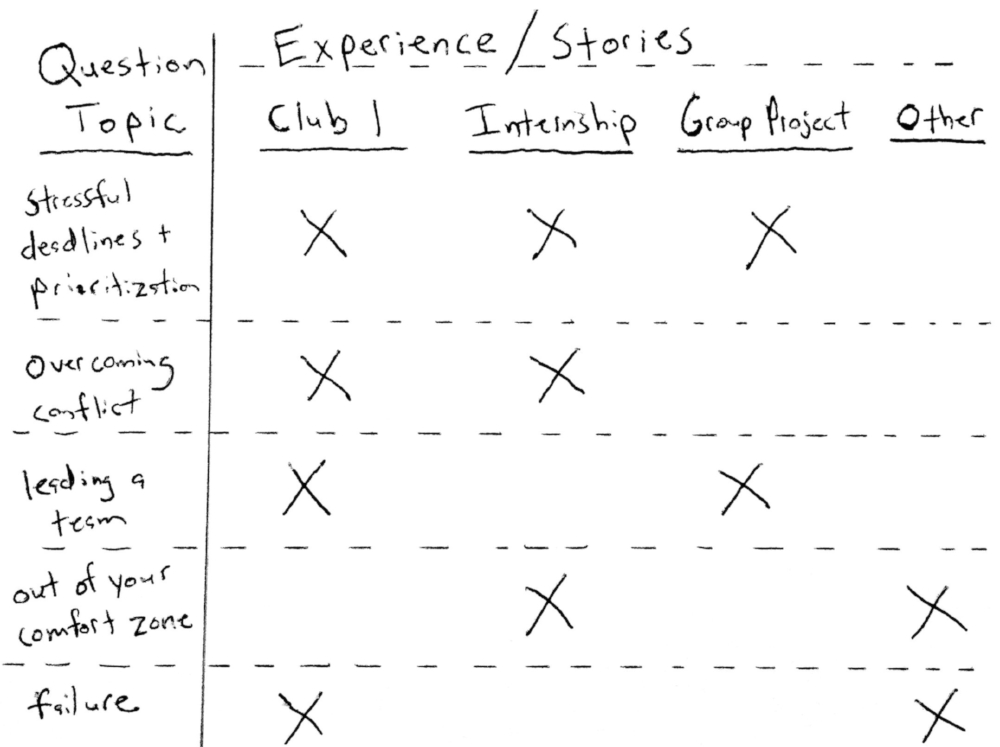Interviews - Nailing the Basics
Interviews are straightforward, right? They ask a question, you answer it, repeat the process. While that mindset sort of works, this article highlights what interviewers really look for and the best way to answer questions you'll definitely be asked.
But before going over how to ace these questions, here are a few things to keep in mind throughout the interview.
The Interviewer is on a Quest
Questions are usually tailored to learn something specific about the candidate. Each question targets different things recruiters want to see. Your job is to match your experiences and qualifications to what they want to learn about you in each question (we’ll go over examples later)
Guide Your Interviewer
Your other job is to give them more than they were looking for. Highlight your relevant key characteristics/experiences regardless of the questions they ask. Do this by preselecting the most impressive things about yourself and finding a way to bring them up in the questions you're asked.
Some characteristics you'll want to highlight include: teamwork, leadership, conflict resolution, communication, overcoming failure, project management, etc.
Story Preparation
Make your life easier by having stories prepared for each skill set/characteristic listed above. Highlight the conflict, how you overcame it, and what you learned from each experience.
Try to share stories about different experiences for each question. Some overlap is completely normal (and recommended) but try not to only talk about one experience for every question.
I like to outline and match my stories like this:
Write out examples/stories/experiences where each of the 'X's are. Circle your best ones in each category and see which experiences you should mention for each type of question
We'll go over this more in the question section later on, but you can also read more on storytelling and verbally painting master pieces here.
Your Impact
Though we all know we need to talk about ourselves in interviews (which can be uncomfortable) you need to make sure you highlight what you specifically did and how your contribution drove the project/experience forward. Mentioning both shows you have skills and understand the impact you made.
Example: Instead of “I organized several volunteer events for 'X Organization' as a Project manager” try: “As a Project Manager in 'X Organization', I led a team of 4 on start-to-finish planning and execution of a soup kitchen event. We gathered over 50 volunteers and served 300 people in our community and increased awareness of local homelessness through strategic partnerships with two nonprofits”
Lasting Impressions
- Do you like hanging out with people who have no interest in being around you? Neither do interviewers. You need to show enthusiasm in your interviews! Even if you say all the right things, often what you don’t say (i.e. appearing uninterested) matters more. You also want to be confident, not cocky. Every recruiter I’ve talked to has told me people who appear too arrogant don’t get offers.
If thrown off by a question, ask the interviewer for a second to think about it so you can collect your thoughts to give them your best answer. (Don’t do this too often or they may think you aren't fast on your feet).
If you mess up a question, you can immediately ask to re-answer it. Say, “I didn’t answer that as clearly as I had wanted, would you like me to rephrase that or would you prefer to move on?” This shows a ton of insight, quick thinking, and adaptability since you’re giving the interviewer the final choice of how to move forward. They aren't out to get you and don't want to see you struggle on questions, it's awkward for everyone.
First impressions are critical but future impressions also matter a lot. After an interview, always follow up and email the person (within 24 hours) to thank them for their time. This is also a great time to “patch” any questions you were weaker on too. Start by saying “I didn’t want to dwell on this in the interview itself, but I didn’t answer your question on ____ as well as I would have liked and wanted to explain it a bit better here.” Then briefly give a better answer. Only do this if you know you were weak on a question or they may misremember you doing poorly even if they hadn’t thought that before.
Nailing the Basics
Don't just answer the question - blow their minds!
If you want tips on how to other tough questions, drop me a line and I'll send you a few ideas!
At the end of each interview, write down what you did well, where you can improve for next time, and things you learned. Practice questions out loud or with friends to get even better.
Finally, don't let your nerves cripple you. Nerves are meant to keep you on your toes and keep you sharp - use them to your advantage and you'll be killing it in no time!

